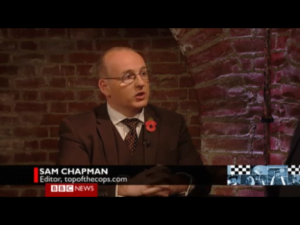Sam Chapman, @topofthecopscom, has worked as a police officer and community safety partnership manager over a long career in criminal justice. He currently runs a successful website dedicated to Police and Crime Commissioners.
Tweeps are people too
I tweet because I’m a junkie – a news junkie, that is. I started with twitter as a kind of news feed, reading and not writing, and never thinking I’d have anything to say, but then the Police and Crime Commissioner elections came along.
‘TopOfTheCops’ was just a play on words when it popped into my head, but with 20 years in policing and crime reduction sandwiched between 2 periods of political activity, I knew I was going to be following these elections in great detail, if not as a participant.
Surely it wouldn’t be too much more to do if I put the links on a blog by that name?
I could finally tweet something, whether it be links to my new posts, or the best comments from candidates and commentators. And so, like many users, I slowly became a supplier too.
That was January, 10 full months ago or, equally, 9,000 tweets ago.
Using Twitter I can keep a growing bunch of fellow addicts immediately updated on what is happening in the election, and I have found an unexpected effect – the news now comes to me.
I get calls, emails, direct messages telling me things that are not in the press or online. High quality news, often before it has been cut with spin, distortion or the “you can’t say that” legal advice.
If only I could pass it all on, though I have to admit a feeling that I must be a socially-responsible dealer.
Not all this stuff is fit to print, and I don’t want to cross the invisible boundaries between news, gossip and rumour-mongering.
The best and worst things about tweeting
The chirrup from my iPad signifying a mention, reply, favouriting or retweet sounds a little mechanical, but actually shows some real personal engagement with someone on an area of shared interest, and as, for most of the last nine months, that has been quite a rare shared interest, there would be little other way for it to be indulged.
But against that is the realisation that it is no longer procrastination that is the thief of time. It’s twitter.
I have too many tweets to read right now, and have to put procrastination off until tomorrow.
So I start “multi-tasking”, never a good idea, and find that people from that oh-so-persistent real world are very easily offended if my attention should wander online while in their presence. They don’t realise that tweeps are people too.
Also, with years of giving the official line now behind me, Twitter represents a dangerous freedom, especially when a badly phrased tweet can stay with you forever
What I get out of tweeting
For me it’s a way of contributing.
Tweeting reminds me of when I found myself on a course at Bramshill [Police Training College, Ed.] for several weeks, but with no fondness for visiting the bar.
At the time the Web was just becoming popular and there was a strangely pyramidal building full of computers where I could while away my time finding out about everything under the sun.
What I wanted to do then was find something that hadn’t been covered and to do it well, yet that required a website and a knowledge of html, whereas now Twitter can provide an ability to contribute with a few taps on the screen of my phone.
Tips and successes
Remember not everyone tweets.
Simply curating a subject of importance to you, and gathering together the best of what has been said into a blog post can make you a source of news that is unrivalled for those who are merely recreational users.
While bad tweets can live forever, most have an evanescent quality that some deserve to outlive.
It’s easy to think “I’ve told everyone that already”, and forget that only a few people actually follow you, and still fewer read every word you say.
(Get Russell to follow you. His headlines for my articles are usually way better than mine.)
Mistakes and failures
I struggle with the idea that someone else can do your tweeting for you.
Corporate feeds can have all the joy of reading Pravda, and it seems such a missed opportunity when this is replicated by individuals.
This medium is not about finding another outlet for your press release, but about having some interactions that will help people understand what you are about.
Tweeting by surrogate not only represents an experiment that can go badly wrong, but it lacks the personal touch which motivates people to follow in the first place.
We saw surrogate tweeting go wrong with Mervyn Barrett, and I worry when newly elected PCCs begin to move their twitter presence to official accounts – is that the last we’ll see of the real them?
Perhaps it’s naive but in an age of spin the personal touch of twitter may raise in us once again the hope that we can find authenticity.
This is the 26th post in the criminal justice/legal Why I tweet series. Read the others here.
Next Week: Jonathan Ledger (@jonathan_napo) General Secretary of Probation Trade Union NAPO, on why he tweets.
Get Russell’s free guide to Twitterfectiveness.

